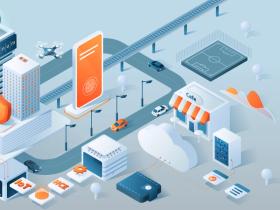How to Build a Custom CRM Software for Your Business
Published: May 2, 2022
18 min read
In this article, you'll learn:
1
👆 When Custom CRM Might Suit You Better Than Pre-Packaged One
2
💻 Types of CRM
3
✅ What to Think of Before Developing a CRM Software
4
⚙️ Features of a CRM Software
5
💡 Takeaways
In fact, 91% of businesses with more than 11 employees use CRM software.
Another vital statistic is that CRM software implementation can increase your revenue per sales rep by up to 41%. Besides, your conversion rate might jump by 300% with a CRM application.
Taking all benefits into account, let’s find out why exactly many businesses are interested in building a CRM, how it works, and what functions and features it should have.
Hold the line to find the answers :)
👆 When Custom CRM Might Suit You Better Than Pre-Packaged One
First of all, you should know that there is pre-packaged CRM software on the market.
Basically, it’s a ready-to-use set of CRM features that is available for everyone on the market.
You might need it if this set of features fully meets your business’ goals you want to reach with the CRM, or you’d like to get to know how it works yourself before allocating the budget for a custom one.
Let’s say, you use CRM where you can set the emailing system. Your competitors do the same.
Can it happen that both of you will use the same emailing template? Yes.
It can result in you and your competitor having a similar emailing design or the same structure.
That means a loss of uniqueness, reputation, and probably you both will lose a potential customer who’ll receive such an email.
Sure thing, it’s not something that would happen at every turn, but still not the most useful situation for your brand.
💻 Types of CRM
To get the most out of CRM implementation, you should deeply understand which types of such software there are on the market.
# 1: Operational CRM 📈
This type of CRM is intended to help businesses automate the tasks mainly in the spheres of marketing, customer service, and sales.
Examples of such systems are call and contact centers & data aggregation systems.
As for the sales part, it helps to generate leads, convert them into sales prospects, assign leads and tasks to the managers.
What is specifically important for marketing purposes, operational CRM analyzes the customers’ behavior and the information about them to have a clear picture of what the target audience looks like.
Speaking of customer support, this type of CRM helps to set automated responses to clients’ requests and store all information about every client.
Mostly this type of software is used by companies in the retail, financial, healthcare, and real estate industries. But of course, there are no limitations in terms of the industry — it all depends on your business goals.
# 2: Strategic CRM 😃
The main purpose of this type of CRM is building and maintaining long-term relationships with customers.
Basically, it centralizes and structures the information about clients and makes it accessible when needed at a couple of clicks.
Typical things such CRMs allow employees to do is discuss something collectively within group chats, share boards with tasks, send various insights and reports, leave comments, and help each other out when needed.
However, don’t take these types as something separate. They can be combined in any way you need to create the most suitable for business goals and a multi-functional solution.
✅ What to Think of Before Developing a CRM Software
In most cases, a well-structured plan plays a big role in whether the project will be successful or not.
Thus, before going into details of the features part, we’d like to recommend you think about a couple of things that will significantly influence your development process.
Your Business Goals 🎯
This is one of the most essential steps in terms of custom CRM development.
Business goals you want to reach by implementing CRM into the workflow will impact the price for the design, type, or type combinations of the CRM you need. Most importantly, it’ll determine the type and number of features you’ll need.
Long story short, it’s something that will lead the whole process.
To meet the requirements, you could use additional security features.
One of such features is end-to-end encryption (E2EE) — a system of communication where no one can monitor the network — neither hackers, nor the government, and nor the company that facilitates the communication (if it’s not you), can see the content and details of the action done.
⚙️ Features of a CRM Software
In this section, we’ll review features to add to build a CRM solution.
However, as you already know, there are several types of CRM and, consequently, different parts of the workflow they serve for.
We’ve divided the workflow into several parts and listed features depending on what part of workflow they help to optimize.
# 1: Team Management Flow 🙌
CRMs can help you automate team management.
Cooperation, a great communicational system, and transparency of the workflow are an integral part of successful work.
Features for the Team Management Flow deal with communication between employees and the alignment of the tasks.
They can include:
- Lists of employees.
This list can be useful if you add a bit more details about each persons’ position in the company.
It can be their department, position, maybe they’re temporary contractors, working hours, and so on.
The main reason why it’s easier is that it better represents the dynamics which helps you estimate the progress.
# 6: Third-party Integrations 🤖
Sure thing, you might already use some third-party services to automate business processes.
What’s great about custom CRM software is that you don’t have to give up on using these services, you can just integrate them into the CRM.
It can be:
- IP telephony like Ring Central.
- An emailing system like Mailchimp.
- Mobile applications.
- Messengers like WhatsApp.
- Social Media integrations.
As you can see, all of these features from various flows aren’t mutually exclusive — they’re rather complementary.
For instance, Accounting & Sales Flow perfectly matches features of Analytical Flow.
So, finding the perfect combination of features is the key to successful CRM software implementation.
💡 Takeaways
These were the main steps you should take to develop a custom CRM software.
To help you better structure the information, let’s briefly summarize what we’ve covered in this article:
- Custom CRMs better meet your business needs since they don’t have any unnecessary features, offer uniqueness, and are built only the way you need.
- There are 4 types of CRM software: operational, strategic, analytical, and collaborative.
- When deciding what you’ll need in your CRM, take your business goals & local and international regulations into account.
So, for custom CRM development:
Was it helpful?
Read also

What is Prototyping in IoT and Some Practical Advice

What is IoT Device Management?

How to Make your React Native Application Accessible to ALL, not just to MANY
Our clients say
![Stormotion client David Lesser, CEO from [object Object]](/static/93e047dadd367691c604d8ffd1f54b58/b0e74/david.png)
They were a delight to work with. And they delivered the product we wanted. Stormotion fostered an enjoyable work atmosphere and focused on delivering a bug-free solution.
David Lesser, CEO
Numina
